- Home
- Roger Zelazny
The Dream Master Page 2
The Dream Master Read online
Page 2
"Just me."
"Very good, sir. Half an hour, then. That's 'Render'?-R-e-n-d-e-r?"
"Right."
"Thank you."
He broke the connection, rose from his desk. Outside, the day had vanished.
The monoliths and the towers gave forth their own light now. A soft snow, like sugar, was sifting down through the shadows and transforming itself into beads on the window-pane.
Render shrugged into his overcoat, turned off the lights, locked the inner office. There was a note on Mrs. Hedge's blotter.
Miss DeVille called, it said.
He crumpled the note and tossed it into the waste-chute. He would call her tomorrow and say he had been working until late on his lecture.
He switched off the final light, clapped his hat onto his head and passed through the outer door, locking it as he went. The drop took him to the sub-subcellar where his auto was parked.
It was chilly in the sub-sub, and his footsteps seemed loud
on the concrete as he passed among the parked vehicles. Beneath the glare of the naked lights, his S-7 Spinner was a sleek gray cocoon from which it seemed turbulent wings might at any moment emerge. The double row of antennae which fanned forward from the slope of its hood added to this feeling. Render thumbed open the door.
He touched the ignition and there was the sound of a lone bee awakening in a great hive. The door swung soundlessly shut as he raised the steering wheel and locked it into place. He spun up the spiral ramp and came to a rolling stop before the big overhead.
As the door rattled upward he lighted his destination screen and turned the knob that shifted the broadcast map. Left to right, top to bottom, section by section he shifted it, until he located the portion of Carnegie Avenue he desired. He punched out its coordinates and lowered the wheel. The car switched over to monitor and moved out onto the highway marginal. Render lit a cigarette.
Pushing his seat back into the centerspace, he left all the windows transparent. It was pleasant to half-recline and watch the oncoming cars drift past him like swarms of fireflies. He pushed his hat back on his head and stared upward.
He could remember a time when he had loved snow, when it had reminded him of novels by Thomas Mann and music by Scandinavian composers. In his mind now, though, there was another element from which it could never be wholly dissociated. He could visualize so clearly the eddies of milk-white coldness that swirled about his old manual-steer auto, flowing into its fire-charred interior to rewhiten that which had been blackened; so clearly—as though he had walked toward it across a chalky lakebottom—it, the sunken wreck, and he, the diver—unable to open his mouth to speak, for fear of drowning; and he knew, whenever he looked upon falling snow, that somewhere skulls were whitening. But nine years had washed away much of the pain, and he also knew that the night was lovely.
He was sped along the wide, wide roads, shot across
high bridges, their surfaces slick and gleaming beneath his lights, was woven through frantic clover leafs and plunged into a tunnel whose dimly glowing walls blurred by him like a mirage. Finally, he switched the windows to opaque and closed his eyes.
He could not remember whether he had dozed for a moment or not, which meant he probably had. He felt the car slowing, and he moved the seat forward and turned on the windows again. Almost simultaneously, the cut-off buzzer sounded. He raised the steering wheel and pulled into the parking dome, stepped out onto the ramp and left the car to the parking unit, receiving his ticket from that box-headed robot which took its solemn revenge on mankind by sticking forth a cardboard tongue at everyone it served.
As always, the noises were as subdued as the lighting. The place seemed to absorb sound and convert it into warmth, to lull the tongue with aromas strong enough to be tasted, to hypnotize the ear with the vivid crackle of the triple hearths.
Render was pleased to see that his favorite table, in the corner off to the right of the smaller fireplace, had been held for him. He knew the menu from memory, but he studied it with zeal as he sipped a Manhattan and worked up an order to match his appetite. Shaping sessions always left him ravenously hungry.
"Dr. Render... ?"
"Yes?" He looked up.
"Dr. Shallot would like to speak with you," said the waiter.
"I don't know anyone named Shallot," he said. "Are you sure he doesn't want Bender? He's a surgeon from Metro who sometimes eats here . .."
The waiter shook his head.
"No sir—'Render.' See here?" He extended a three-by-five card on which Render's full name was typed in capital letters. "Dr. Shallot has dined here nearly every night for the past two weeks," he explained, "and on each occasion has asked to be notified if you came in."
"Hm?" mused Render. "That's odd. Why didn't he just call me at my office?"'
The waiter smiled and made a vague gesture.
"Well, tell him to come on over," he said, gulping his Manhattan, "and bring me another of these."
"Unfortunately, Dr. Shallot is blind," explained the waiter. "It would be easier if you—"
"All right, sure." Render stood up, relinquishing his favorite table with a strong premonition that he would not be returning to it that evening.
"Lead on."
They threaded their way among the diners, heading up to the next level. A familiar face said "hello" from a table set back against the wall, and Render nodded a greeting to a former seminar pupil whose name was Jurgens or Jirkans or something like that.
He moved on, into the smaller dining room wherein only two tables were occupied. No, three. There was one set in the corner at the far end of the darkened bar, partly masked by an ancient suit of armor. The waiter was heading him in that direction.
They stopped before the table and Render stared down into the darkened glasses that had tilted upward as they approached. Dr. Shallot was a woman, somewhere in the vicinity of her early thirties. Her low bronze bangs did not fully conceal the spot of silver which she wore on her forehead like a caste-mark. Render inhaled, and her head jerked slightly as the tip of his cigarette flared. She appeared to be staring straight up into his eyes. It was an uncomfortable feeling, even knowing that all she could distinguish of him was that which her minute photo-electric cell transmitted to her visual cortex over the hair-fine wire implants attached to that oscillator-converter: in short, the glow of his cigarette.
"Dr. Shallot, this is Dr. Render," the waiter was saying.
"Good evening," said Render.
"Good evening," she said. "My name is Eileen and I've wanted very badly to meet you." He thought he detected a slight quaver in her voice. "Will you join me for dinner?"
"My pleasure," he acknowledged, and the waiter drew out the chair.
Render sat down, noting that the woman across from him already had a drink. He reminded the waiter of his second Manhattan.
"Have you ordered yet?" he inquired.
"No."
"... And two menus—" he started to say, then bit his tongue.
"Only one." She smiled.
"Make it none," he amended, and recited the menu.
They ordered. Then:
"Do you always do that?"
"What?"
"Carry menus in your head."
"Only a few," he said, "for awkward occasions. What was it you wanted to see—talk to me about?"
"You're a neuroparticipant therapist," she stated, "a Shap-er."
"And you are—?"
"—a resident in psychiatry at State Psych. I have a year remaining."
"You knew Sam Riscomb then."
"Yes, he helped me get my appointment. He was my adviser."
"He was a very good friend of mine. We studied together at Menninger."
She nodded.
"I'd often heard him speak of you—that's one of the reasons I wanted to meet you. He's responsible for encouraging me to go ahead with my plans, despite my handicap."
Render stared at her. She was wearing a dark green dress which appeared to be made of v
elvet. About three inches to the left of the bodice was a pin which might have been gold. It displayed a red stone which could have been a ruby, around which the outline of a goblet was cast. Or was it really two profiles that were outlines, staring through the stone at one another? It seemed vaguely familiar to him, but
he could not place it at the moment. It glittered expensively in the dim light.
Render accepted his drink from the waiter.
"I want to become a neuroparticipant therapist," she told him.
And if she had possessed vision Render would have thought she was staring at him, hoping for some response in his expression. He could not quite calculate what she wanted him to say.
"I commend your choice," he said, "and I respect your ambition." He tried to put his smile into his voice. "It is not an easy thing, of course, not all of the requirements being academic ones."
"I know," she said. "But then, I have been blind since birth and it was not an easy thing to come this far."
"Since birth?" he repeated. "I thought you might have lost your sight recently. You did your undergrad work then, and went on through med school without eyes... That's— rather impressive."
"Thank you," she said, "but it isn't. Not really. I heard about the first neuroparticipants—Bartelmetz and the rest-when I was a child, and I decided then that I wanted to be one. My life ever since had been governed by that desire."
"What did you do in the labs?" he inquired. "—Not being able to see a specimen, look through a microscope... ? Or all that reading?"
"I hired people to read my assignments to me. I taped everything. The school understood that I wanted to go into psychiatry, and they permitted a special arrangement for labs. I've been guided through the dissection of cadavers by lab assistants, and I've had everything described to me. I can tell things by touch... and I have a memory like yours with the menu." She smiled. " "The quality of psycho-participation phenomena can only be gauged by the therapist himself, at that moment outside of time and space as we normally know it, when he stands in the midst of a world erected from the stuff of another man's dreams, recognizes
there the non-Euclidian architecture of abberrance, and then : takes his patient by the hand and tours the landscape... If he can lead him back to the common earth, then his judgments were sound, his actions valid.' "
"From Why No Psychometrics in This Place," reflected Render.
"-by Charles Render, M.D."
"Our dinner is already moving in this direction," he noted, picking up his drink as the speed-cooked meal was pushed toward them in the kitchen-buoy.
"That's one of the reasons I wanted to meet you," she continued, raising her glass as the dishes rattled before her. "I want you to help me become a Shaper."
Her shaded eyes, as vacant as a statue's, sought him again.
"Yours is a completely unique situation," he commented. "There has never been a congenitally blind neuroparticipant —for obvious reasons. I'd have to consider all the aspects of the situation before I could advise you. Let's eat now, though. I'm starved."
"All right. But my blindness does not mean that I have never seen."
He did not ask her what she meant by that, because prime ribs were standing in front of him now and there was a bottle of Chambertin at his elbow. He did pause long enough to notice though, as she raised her left hand from beneath the table, that she wore no rings.
"I wonder if it's still snowing," he commented as they drank their coffee. "It was coming down pretty hard when I pulled into the dome."
"I hope so," she said, "even though it diffuses the light and I can't 'see' anything at all through it. I like to feel it falling about me and blowing against my face."
"How do you get about?"
"My dog, Sigmund—I gave him the night off," she smiled —"he can guide me anywhere. He's a mutie Shepherd."
"Oh?" Render grew curious. "Can he talk much?"
She nodded.
"That operation wasn't as successful on him as on some of them, though. He has a vocabulary of about four hundred words, but I think it causes him pain to speak. He's quite intelligent. You'll have to meet him sometime."
Render began speculating immediately. He had spoken with such animals at recent medical conferences, and had been startled by their combination of reasoning ability and their devotion to their handlers. Much chromosome tinkering, followed by delicate embryo-surgery, was required to give a dog a brain capacity greater than a chimpanzee's. Several followup operations were necessary to produce vocal abilities. Most such experiments ended in failure, and the dozen or so puppies a year on which they succeeded were valued in the neighborhood of a hundred thousand dollars each. He realized then, as he lit a cigarette and held the light for a moment, that the stone in Miss Shallot's medallion was a genuine ruby. He began to suspect that her admission to a medical school might, in addition to her academic record, have been based upon a sizable endowment to the college of her choice. Perhaps he was being unfair though, he chided himself.
"Yes," he said, "we might do a paper on canine neuroses. Does he ever refer to his father as "that son of a female Shepherd'?"
"He never met his father," she said, quite soberly. "He was raised apart from other dogs. His attitude could hardly be typical. I don't think you'll ever learn the functional psychology of the dog from a mutie."
"I imagine you're right," he dismissed it. "More coffee?"
"No, thanks."
Deciding it was time to continue the discussion, he said, "So you want to be a Shaper..."
"Yes."
"I hate to be the one to destroy anybody's high ambitions," he told her. "Like poison, I hate it. Unless they have no foundation at all in reality. Then I can be ruthless. So— honestly, frankly, and in all sincerity, I do not see how it could ever be managed. Perhaps you're a fine psychiatrist—
but in my opinion, it is a physical and mental impossibility for you ever to become a neuroparticipant. As for my reasons—"
"Wait," she said. "Not here, please. Humor me. I'm tired of this stuffy place—take me somewhere else to talk. I think I might be able to convince you there is a way."
"Why not?" He shrugged. "I have plenty time. Sure—you call it. Where?"
"Blindspin?"
He suppressed an unwilling chuckle at the expression, but she laughed aloud.
"Fine," he said, "but I'm still thirsty."
A bottle of champagne was tallied and he signed the check despite her protests. It arrived in a colorful "Drink While You Drive" basket, and they stood then, and she was tall, but he was taller.
Blindspin.
A single name of a multitude of practices centered about the auto-driven auto. Flashing across the country in the sure hands of an invisible chauffeur, windows all opaque, night dark, sky high, tires assailing the road below like four phantom buzzsaws—and starting from scratch and ending in the same place, and never knowing where you are going or where you have been—it is possible, for a moment, to kindle some feeling of individuality in the coldest brainpan, to produce a momentary awareness of self by virtue of an apartness from all but a sense of motion. This is because movement through darkness is the ultimate abstraction of life itself—at least that's what one of the Vital Comedians said, and everybody in the place laughed.
Actually now, the phenomenon known as blindspin first became prevalent (as might be suspected) among certain younger members of the community, when monitored highways deprived them of the means to exercise their automobiles in some of the more individualistic ways which had come to be frowned upon by the National Traffic Control Authority. Something had to be done.
It was.
The first, disastrous reaction involved the simple engineering feat of disconnecting the broadcast control unit after one had entered onto a monitored highway. This resulted in the car's vanishing from the ken of the monitor and passing back into the control of its occupants. Jealous as a deity, a monitor will not tolerate that which denies its progr
ammed omniscience; it will thunder and lightning in the Highway Control Station nearest the point of last contact, sending winged seraphs in search of that which has slipped from sight.
Often, however, this was too late in happening, for the roads are many and well-paved. Escape from detection was, at first, relatively easy to achieve.
Other vehicles, though, necessarily behave as if a rebel has no actual existence. Its presence cannot be allowed for.
Boxed-in, on a heavily-traveled section of roadway, the offender is subject to immediate annihilation in the event of any overall speedup or shift in traffic pattern which involves movement through his theoretically vacant position. This, in the early days of monitor-controls, caused a rapid series of collisions. Monitoring devices later became far more sophisticated, and mechanized cutoffs reduced the collision incidence subsequent to such an action. The quality of the pulpefactions and contusions which did occur, however remained unaltered.
The next reaction was based on a thing which had been overlooked because it was obvious. The monitors took people where they wanted to go only because people told them they wanted ot go there. A person pressing a random series of coordinates, without reference to any map, would either be left with a stalled automobile and a "RECHECK YOUR COORDINATES" light, or would suddenly be whisked away in any direction. The latter possesses a certain romantic appeal in that it offers speed, unexpected sights, and free hands. Also, it is perfectly legal; and it is possible to navigate all over two continents in this manner, if one is possessed of sufficient wherewithal and gluteal stamina.
As is the case in all such matters, the practice diffused upwards through the age brackets. School teachers who only drove on Sundays fell into disrepute as selling points for used autos. Such is the way a world ends, said the entertainer.
End or no, the car designed to move on monitored highways is a mobile efficiency unit, complete with latrine, cupboard, refrigerator compartment and gaming table. It also sleeps two with ease and four with some crowding. On occasion, three can be a real crowd.
Render drove out of the dome and into the marginal aisle. He halted the car.
"Want to jab some coordinates?" he asked.

 Seven Tales in Amber
Seven Tales in Amber Frost and Fire
Frost and Fire Doorways in the Sand
Doorways in the Sand Unicorn Variation
Unicorn Variation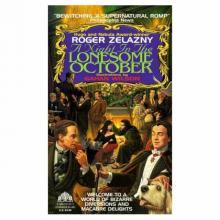 A Night in the Lonesome October
A Night in the Lonesome October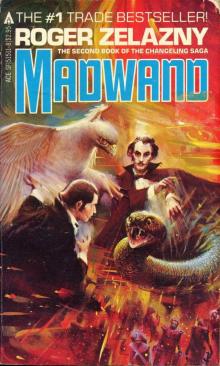 Madwand
Madwand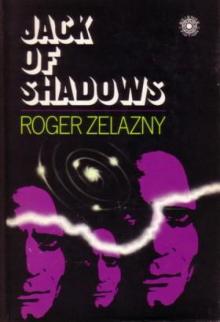 Jack Of Shadows
Jack Of Shadows Lord of Light
Lord of Light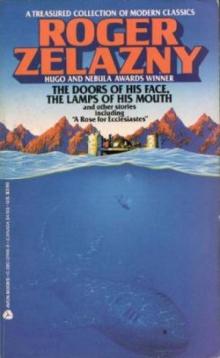 The Doors of His Face, The Lamps of His Mouth and Other Stories
The Doors of His Face, The Lamps of His Mouth and Other Stories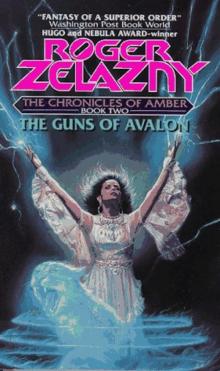 Guns Of Avalon tcoa-2
Guns Of Avalon tcoa-2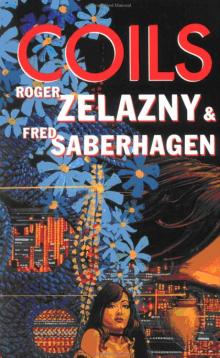 Coils
Coils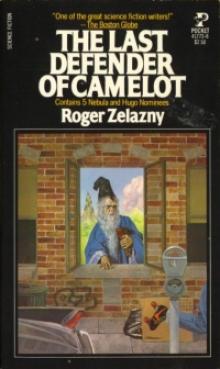 The Last Defender Of Camelot
The Last Defender Of Camelot Creatures of Light and Darkness
Creatures of Light and Darkness This Immortal
This Immortal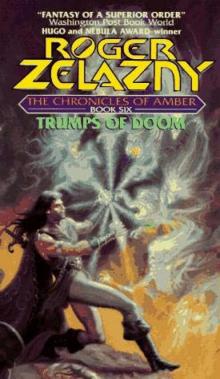 Trumps of doom tcoa-6
Trumps of doom tcoa-6 The Dream Master
The Dream Master The Complete Dilvish, The Damned
The Complete Dilvish, The Damned Nine Princes in Amber
Nine Princes in Amber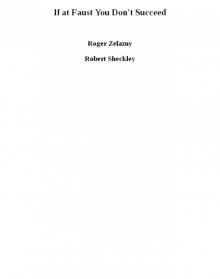 If at Faust You Don't Succeed
If at Faust You Don't Succeed Here there be dragons
Here there be dragons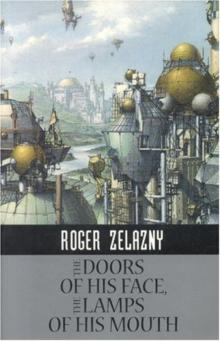 The Doors Of His Face, The Lamps Of His Mouth
The Doors Of His Face, The Lamps Of His Mouth The Great Book of Amber - Chronicles 1-10
The Great Book of Amber - Chronicles 1-10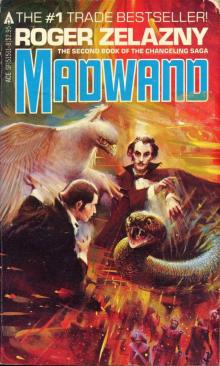 Madwand (Illustrated)
Madwand (Illustrated) The Chronicles of Amber
The Chronicles of Amber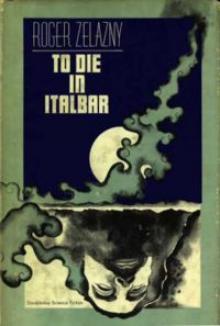 To Die In Italbar
To Die In Italbar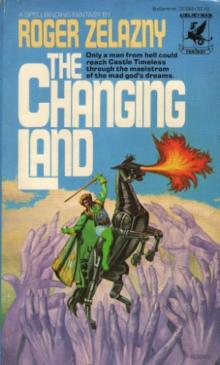 The Changing Land
The Changing Land The Furies
The Furies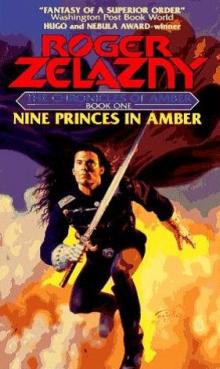 Nine Princes In Amber tcoa-1
Nine Princes In Amber tcoa-1 Last Of The Wild Ones
Last Of The Wild Ones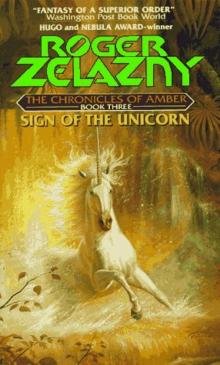 Sign of the Unicorn tcoa-3
Sign of the Unicorn tcoa-3 My Name is Legion
My Name is Legion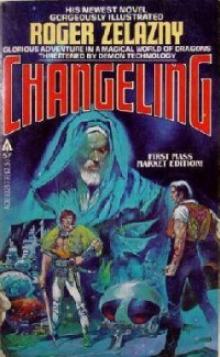 Wizard World 1: Changeling
Wizard World 1: Changeling Changeling
Changeling The Shroudling and the Guisel (amber stories)
The Shroudling and the Guisel (amber stories)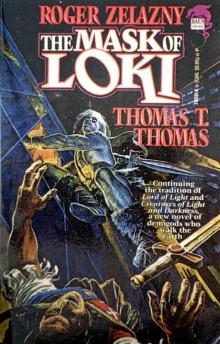 The Mask of Loki
The Mask of Loki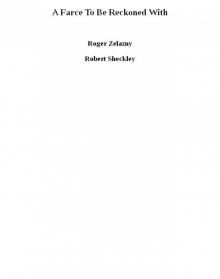 A Farce To Be Reckoned With
A Farce To Be Reckoned With Roadmarks
Roadmarks When Pussywillows Last in the Catyard Bloomed (rtf)
When Pussywillows Last in the Catyard Bloomed (rtf)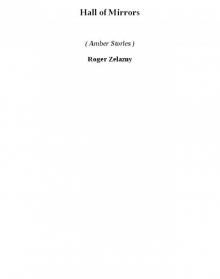 Hall of Mirrors (amber stories)
Hall of Mirrors (amber stories) Permafrost
Permafrost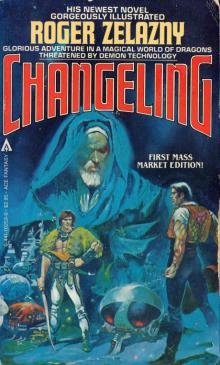 Changeling (Illustrated)
Changeling (Illustrated)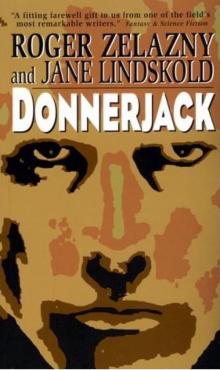 Donnerjack
Donnerjack Shadows & Reflections: A Roger Zelazny Tribute Anthology
Shadows & Reflections: A Roger Zelazny Tribute Anthology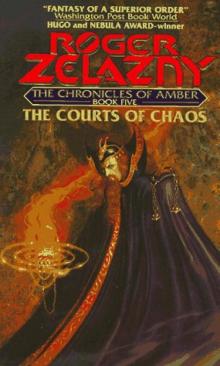 The Courts Of Chaos tcoa-5
The Courts Of Chaos tcoa-5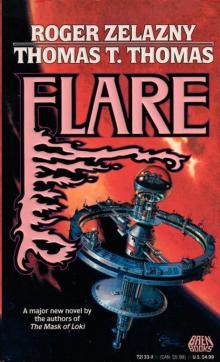 Flare
Flare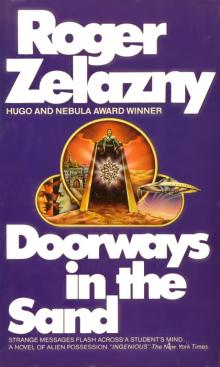 Doorsways in the Sand
Doorsways in the Sand The Great Book of Amber
The Great Book of Amber Home Is the Hangman
Home Is the Hangman For a Breath I Tarry
For a Breath I Tarry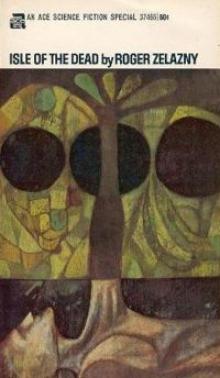 Isle Of The Dead
Isle Of The Dead Salesman Tale (amber stories)
Salesman Tale (amber stories) Dismal Light
Dismal Light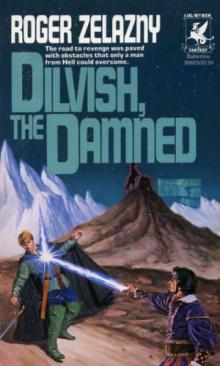 Dilvish, The Damned
Dilvish, The Damned The Black Throne
The Black Throne Wizard World 2: Madwand
Wizard World 2: Madwand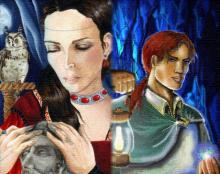 The Salesman's Tale
The Salesman's Tale